How products are evaluated in terms of protein digestibility
First of all, for muscle growth requires food protein. Essential amino acids that come with food, become a building material for new muscle cells, so without enough protein you will not achieve muscle growth.
However, in addition to the amount of protein in foods, it is also necessary to take into account its nutritional value and digestibility. Now, the protein digestibility corrected amino acid score (PDCAAS), or the amino acid coefficient of protein digestion, is used to evaluate protein digestibility.
PDCAAS shows how the amino acid composition of the product corresponds to human needs. The upper limit of this scale is 1.0. Products that have such a coefficient are best absorbed and are full-fledged sources of protein.
The PDCAAS indicators of the products listed below are taken from the articleEmerging Evidence for the Importance of Dietary Protein Source on Glucoregulatory Markers and Type 2 Diabetes: Different Effects of Dairy, Meat, Fish, Egg, and Plant Protein Foods Kevin B. Comerford, a specialist at the California Research Foundation for Dairy Products.
The best products for muscle building
1. Milk
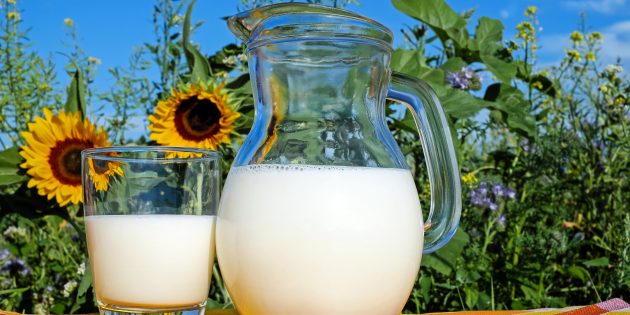
Protein content in 100 g of product: 3.2 g.
PDCAAS: 1.0.
In the scientific reviewProtein timing and its effects on muscular hypertrophy and strength in individuals engaged in weight-training Matthew Stark of the University of Northern Illinois states that milk is almost completely absorbed by the body, causing protein synthesis and tissue repair, and provides all essential amino acids.
OverviewMilk: the new sports drink? A Review scientific research in 2008 showed that milk dramatically increases protein synthesis in muscles. Consumption of milk after exercise, combined with strength training for 12 weeks, increases muscle hypertrophy and dry muscle mass.
StudyMilk ingestion stimulates net muscle protein 2006 showed that whole milk provides 2.8 times more threonine (an essential amino acid that is involved in building muscle protein) than skimmed milk, and 80% more phenylalanine (another essential amino acid that is part of the body’s proteins).
2. Curd
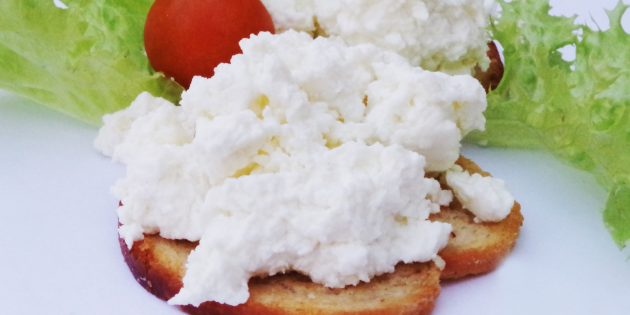
Protein content in 100 g of product: 16.7 g.
PDCAAS: 1.0.
Curd is 70% consists of casein, a slowly digesting complex protein. This means that the level of amino acids in the blood rises slowly and remains elevated for 6-8 hours. Therefore, cottage cheese is often advised to eat before a long break between meals, for example at night. This allows you to maintain anabolism until the next meal.
In addition, the curd contains a lot of calcium, which is necessaryClayton’s Health Facts: Calcium for muscle contraction and plays an important role in the transfer of amino acids and creatine.
3 eggs
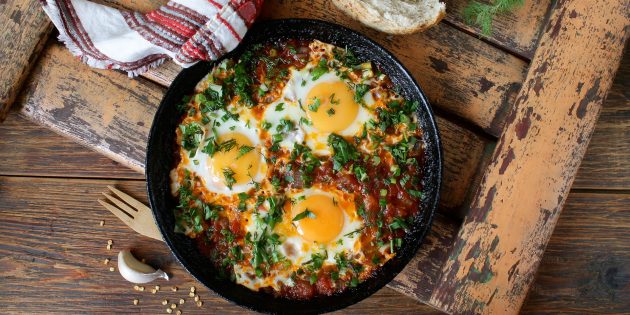
Protein content in 100 g of product: 12 g.
PDCAAS: 1.0.
According to the studyEgg and Egg-Derived Foods: Effects on Human Health and Use as Functional Foods Jose M. Miranda, 15 grams of protein from the egg protein contains 1,300 mg of leucine. The recent experimentEffects of egg white protein supplementation on muscle strength and serum free amino acid concentrations showed that leucine causes the maximum anabolic response in skeletal muscles of young people, so that egg protein can have a big impact on muscle building.
It is leucine that stimulates the synthesis of skeletal muscles, regardless of other amino acids. In addition, leucine reducesExcess leucine intake enhances muscle anabolic signaling and not net protein anabolism in young men and women the rate of decay of the muscle protein.
And in the egg yolk contains 3.44 milligrams of zinc per 100 grams of product. Zinc is also useful for muscle growth. StudyThe Role of Zinc in Growth and Cell Proliferation 2016 showed that zinc is necessary for the formation of an insulin-like growth factor, which provokes the development of muscles.
Nutritionists are often advised to consume no more than four eggs per week because of high cholesterol (200-300 mg) in the yolk. However, despite a lot of research, there is still no consensus about the dangers of eggs for heart health.
In the article, Jose Miranda, there is an assumption that only 30% of the world population is hypersensitive to dietary cholesterol, and the remaining 70% are hypo-sensitive. The former already have an increased level of cholesterol and can get harm from consumption of eggs in large quantities, whereas the second egg will bring more health benefits than harm. As Miranda points out, modern guidelines for healthy eating allow you to eat one egg a day.
4. Beef
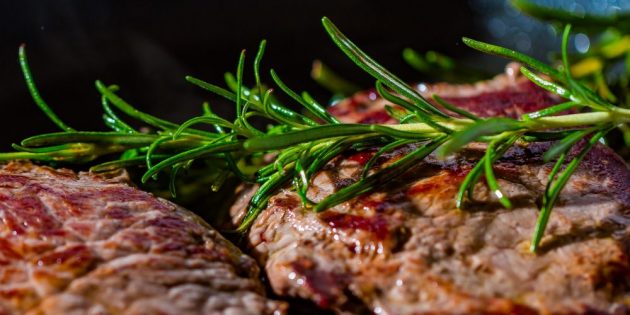
Protein content in 100 g of product: 25 g in cooked beef.
PDCAAS: 0.92.
Beef contains high quality protein, which contains all the essential amino acids in the same proportions as in human muscles.
The study of 2014 provedProtein Supplementation with Low Fat Meat after Resistance Training: Effects on Body Composition and Strength the effectiveness of the consumption of beef to increase the weight without fat. 26 healthy young people participated in the study. The first group after the exercise ate 135 grams of canned beef with 20 grams of protein and 1.7 grams of fat per 100 grams of product. The second, control group was trained without a subsequent meal. After eight weeks, the first group of weight without fat increased by 2.3 kilograms.
StudyThe anabolic response to resistance exercise is not diminished by age 2011 confirmed that exercise combined with consumption of 240 grams of beef increased the synthesis of muscle protein in both young (29 ± 3 years) and elderly (67 ± 2 years) participants.
StudyThe effects of beef protein isolate and whey protein isolate supplementation on lean mass 2015 showed that the protein from beef is also effective for building muscle mass, as well as whey protein. After eight weeks of training and protein intake, participants consuming protein from beef increased their weight without fat by 5.7%, lost 10% of fat, increased a one-time maximum in bench press and deadlift compared to the group that does not consume protein supplements.
5. Chicken Breast
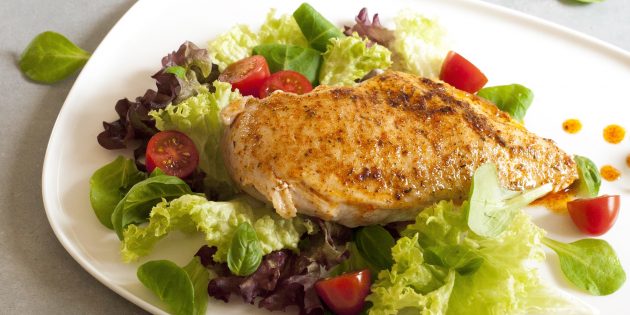
Protein content in 100 g of product: 31 g in boiled breast.
PDCAAS: 0.92.
StudyThe Effects of Beef, Chicken, or Whey Protein Post-Workout on Body Composition and Muscle Performance showed that the hydrolyzate of chicken protein also affects the buildup of muscle mass, like beef protein and whey protein. The participants of the experiment, consuming protein from chicken, an average of two kilograms increased weight without fat, increased one-time maximum in deadlift and bench press.
Chicken breast is appreciated among bodybuilders for a large amount of quality protein and a small amount of fat – only 1.9 grams per 100 grams of product. If you have elevated cholesterol, give preference to the breast, and not to other parts of the chicken. The study showedCholesterol content in meat of some poultry and fish species as influenced by live weight and total lipid content , that in 100 grams of chicken breast contains 53 milligrams of cholesterol, and in the hip – 82.9 milligrams.
6. Fish (trout, salmon, cod)
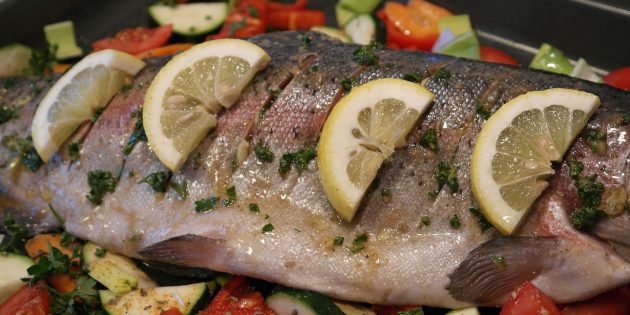
The protein content in 100 g of product: 18-22 g.
PDCAAS: 0.78.
In addition to the listed species, about 20 grams of digestible protein is found in the meat of tuna, chum, pink salmon, mackerel, mackerel. In addition, the fish is low-calorie and contains unsaturated fatty acids, useful for health.
Unsaturated omega-3 fatty acids, in addition to other health benefits, also accelerate muscle growth. StudyOmega-3 polyunsaturated fatty acids augment the muscle protein anabolic response to hyperaminoacidemia-hyperinsulinemia in healthy young and middle-aged men and women Gordon I. Smith, 2011, showed that taking 4 grams of a prescription omega-3-acid supplement a day for eight weeks significantly increased the anabolic response to amino acids and insulin sensitivity. After taking the supplement, the protein concentration in the muscles and the size of the muscle cells increased.
The fatter the fish, the more useful fatty acids it contains. For example, mackerel contains 2.6 grams of omega-3 per 100 grams of product, in salmon it is 2.5 grams, and in tuna and cod, only 0.2 grams.
7. Chickpeas
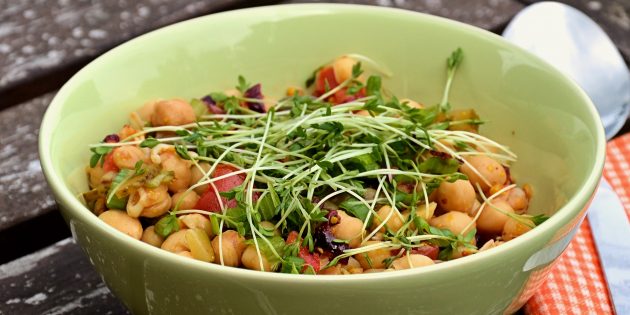
Protein content in 100 g of product: 19 g in raw chickpeas, 8.86 g in boiled.
PDCAAS: 0.78.
Chickpeas, or chick peas, are more popular in the Middle East, but now it can be found in almost any large supermarket.
According to the studyThe Nutritional Value and Health Benefits of Chickpeas and Hummus , four tablespoons of hummus (thick mashed potatoes) from chickpeas provide 14 grams of vegetable protein, 25 grams of fiber and lots of vitamins and minerals.
The chickpea contains a complex of essential amino acids: leucine, isoleucine and valine, necessary for muscle growth; glycine, arginine and methionine, of which creatine is synthesized. Also in it there are 3.43 milligrams of zinc per 100 grams of product.
This bean culture will be an excellent substitute for animal protein for vegetarians and a variety of side dishes for those who eat meat.
Share your favorite recipes for foods high in protein in the comments to the article.
